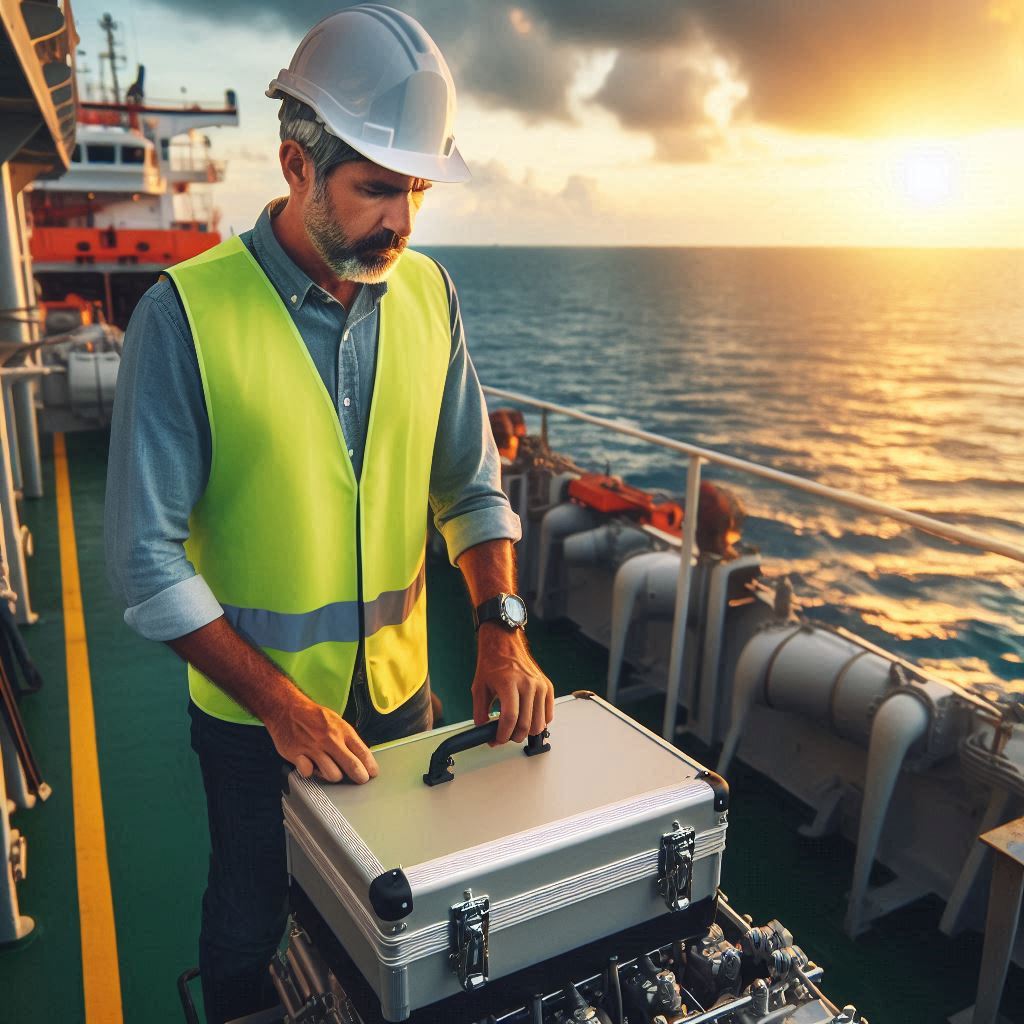Introduction
Overview of the Role of Petroleum Engineer
Petroleum Engineers are essential for extracting oil and gas from underground reservoirs.
They design and implement methods to enhance the efficiency of resource recovery.
Their responsibilities span from reservoir management to drilling operations and production optimization.
They apply advanced technology to ensure that extraction processes are effective and sustainable.
Importance of Petroleum Engineers in the Oil and Gas Industry
Petroleum Engineers play a critical role in the oil and gas industry.
They help meet the world’s growing energy demands by developing methods to maximize resource recovery while minimizing environmental impact.
Their work is crucial for maintaining operational efficiency and safety standards.
As energy needs continue to rise, their expertise becomes even more significant.
Thesis Statement Outlining the Roles and Responsibilities of Petroleum Engineers
This blog will explore the diverse roles and responsibilities of Petroleum Engineers.
We will cover their involvement in reservoir management, drilling operations, and production optimization.
Understanding these aspects will underscore their vital contributions to the energy sector and their role in addressing global energy challenges.
Education and Qualifications for Petroleum Engineers
Educational Requirements to Become a Petroleum Engineer
To become a Petroleum Engineer, you need a solid educational foundation.
A bachelor’s degree in Petroleum Engineering, Mechanical Engineering, or a related field is essential.
Specialized programs in Petroleum Engineering offer targeted knowledge.
Advanced degrees, like a master’s or doctorate, can enhance career prospects and open doors to research roles.
Skills and Knowledge Needed for the Role
Petroleum Engineers must understand geology, thermodynamics, and fluid mechanics.
Knowledge of reservoir behavior, drilling techniques, and production methods is crucial.
Skills in mathematics and computer modeling are vital for analyzing data and designing efficient extraction processes.
Practical experience, gained through internships or co-op programs, is invaluable for improving problem-solving abilities and technical skills.
Licensing and Certification Needed to Practice as a Petroleum Engineer
Licensing requirements vary by country.
In the United States, Petroleum Engineers must obtain a Professional Engineer (PE) license.
This involves passing the Fundamentals of Engineering (FE) exam and gaining relevant work experience.
After accumulating the necessary experience, you can sit for the Principles and Practice of Engineering (PE) exam.
Continuing education may be required to maintain this license.
Certifications from professional organizations like the Society of Petroleum Engineers (SPE) can further boost career prospects.
These certifications are not mandatory but can enhance your credentials and job opportunities.
In summary, becoming a Petroleum Engineer involves completing a relevant degree, gaining practical experience, and obtaining necessary licenses and certifications.
Building a strong foundation in engineering principles, along with practical skills and ongoing education, will help you excel in this challenging and rewarding field.
Read: The Role of Aerospace Engineers in Satellite Development
Exploration and Drilling
Responsibilities Related to Exploration of Potential Oil and Gas Reserves
Petroleum Engineers play a crucial role in exploring potential oil and gas reserves.
They use advanced technologies to survey and assess subsurface formations.
This involves analyzing geological data, seismic surveys, and core samples to identify promising sites.
Engineers work closely with geologists to interpret data and predict where reserves might be located.
They also design exploratory drilling programs to test these predictions.
Involvement in Drilling Operations and Techniques
In drilling operations, Petroleum Engineers oversee the entire process.
They design and implement drilling plans to efficiently access oil and gas reserves.
Engineers select appropriate drilling equipment and techniques based on the geological conditions.
They monitor drilling operations to ensure efficiency and safety, adjusting techniques as necessary.
Engineers also handle well completion and production processes, ensuring that wells are safely brought into production.
Ensuring Compliance with Environmental Regulations During Exploration and Drilling Processes
Compliance with environmental regulations is a critical aspect of Petroleum Engineering.
Engineers must ensure that exploration and drilling activities adhere to environmental laws and standards.
This includes implementing measures to prevent oil spills, manage waste, and reduce emissions.
Engineers work with regulatory bodies to obtain necessary permits and conduct environmental impact assessments.
They also develop and follow protocols to minimize environmental damage and address any issues that arise during operations.
In summary, Petroleum Engineers are responsible for exploring oil and gas reserves, overseeing drilling operations, and ensuring environmental compliance.
Their work involves a combination of technical expertise, operational oversight, and environmental stewardship, making them essential to the responsible development of energy resources.
Read: Aerospace Engineering in Commercial Spaceflight
Production and Reservoir Management
Monitoring and Optimizing Production Rates of Oil and Gas Wells
Petroleum Engineers are tasked with monitoring and optimizing production rates of oil and gas wells.
They use real-time data from sensors and monitoring systems to track well performance.
By analyzing production data, engineers can identify issues such as pressure drops or equipment malfunctions.
They implement strategies to optimize production, adjusting parameters like flow rates and injection pressures to enhance efficiency.
Regular maintenance and timely interventions help sustain optimal production levels over time.
Managing Reservoirs to Maximize Extraction Efficiency
Effective reservoir management is key to maximizing extraction efficiency.
Engineers analyze reservoir data to understand its characteristics, such as pressure, temperature, and fluid composition.
They develop and implement strategies for managing reservoir pressure and fluid movement to optimize recovery.
This might involve techniques like water flooding or gas injection to maintain pressure and enhance oil recovery.
Engineers also monitor reservoir performance and adjust strategies as needed to ensure long-term productivity.
Implementing Technologies to Enhance Production and Reservoir Management
Technological advancements play a significant role in enhancing production and reservoir management.
Engineers implement advanced technologies such as enhanced oil recovery (EOR) techniques, automated monitoring systems, and data analytics tools.
These technologies improve the accuracy of reservoir models, streamline production processes, and enhance overall efficiency.
For example, real-time data analytics can provide insights into reservoir behavior, leading to more informed decision-making and optimized production strategies.
In summary, Petroleum Engineers focus on monitoring and optimizing production rates, managing reservoirs to maximize extraction efficiency, and implementing advanced technologies.
Their work ensures efficient and sustainable extraction of oil and gas resources, balancing productivity with long-term reservoir health.
Read: Exploring Subfields of Aerospace Engineering

Health, Safety, and Environmental Concerns
Ensuring Adherence to Safety Protocols and Regulations in All Operations
Petroleum Engineers must ensure adherence to safety protocols and regulations in all operations.
They implement rigorous safety standards to protect workers and equipment.
This includes developing and enforcing procedures for safe drilling, production, and maintenance activities.
Engineers conduct regular safety audits and training sessions to ensure compliance with industry regulations.
By maintaining high safety standards, they reduce the risk of accidents and enhance overall operational safety.
Identifying and Mitigating Potential Environmental Impacts of Oil and Gas Operations
Identifying and mitigating potential environmental impacts is crucial in Petroleum Engineering.
Engineers assess the environmental impact of exploration, drilling, and production activities.
They develop strategies to minimize adverse effects, such as preventing oil spills, managing waste, and controlling emissions.
Environmental impact assessments are conducted to evaluate potential risks before operations begin.
Engineers implement best practices and technologies to protect ecosystems and ensure that operations comply with environmental regulations.
Implementing Measures to Minimize Health Risks for Workers in the Oil and Gas Industry
Minimizing health risks for workers is a key responsibility for Petroleum Engineers.
They implement health and safety measures to protect workers from occupational hazards.
This includes providing personal protective equipment (PPE), ensuring proper training on safety procedures, and conducting regular health checks.
Engineers also design safe work environments by addressing potential hazards such as exposure to harmful substances or extreme conditions.
By focusing on worker health and safety, engineers contribute to a safer and healthier work environment.
In summary, Petroleum Engineers address health, safety, and environmental concerns by adhering to safety protocols, mitigating environmental impacts, and implementing measures to protect worker health.
Their efforts ensure that oil and gas operations are conducted safely, responsibly, and with minimal impact on people and the environment.
Read: Biomedical Engineering: Regulatory Affairs
Research and Innovation
Conducting Research to Develop New Technologies and Techniques in the Field
Petroleum Engineers play a crucial role in conducting research to develop new technologies and techniques.
They explore innovative methods to improve drilling efficiency, enhance recovery processes, and reduce costs.
Research may focus on advanced materials, new extraction techniques, or more effective environmental management practices.
By investing in research, engineers push the boundaries of what is possible in the field, driving technological advancements that benefit the industry.
Transform Your Career Today
Unlock a personalized career strategy that drives real results. Get tailored advice and a roadmap designed just for you.
Start NowCollaborating with Colleagues to Improve Efficiency and Sustainability in Oil and Gas Production
Collaboration is key to improving efficiency and sustainability in oil and gas production.
Petroleum Engineers work closely with colleagues across various disciplines, including geologists, environmental scientists, and production specialists.
Together, they identify opportunities for optimization and develop solutions to enhance performance.
Joint efforts may lead to innovations such as more efficient production methods or sustainable practices that reduce the environmental impact of operations.
Collaborative approaches ensure that diverse expertise contributes to solving complex challenges.
Staying Updated on Industry Trends and Advancements to Enhance Job Performance
Staying updated on industry trends and advancements is essential for enhancing job performance.
Petroleum Engineers actively seek knowledge about the latest technologies, regulatory changes, and best practices.
They participate in professional development activities, such as conferences, workshops, and industry publications.
By remaining informed, engineers can apply new insights to their work, adopt cutting-edge technologies, and maintain a competitive edge in the field.
Continuous learning and adaptation ensure that engineers contribute effectively to their organizations and the industry as a whole.
In summary, Petroleum Engineers drive research and innovation by developing new technologies, collaborating to enhance efficiency and sustainability, and staying updated on industry advancements.
Their commitment to innovation ensures that the oil and gas industry evolves to meet new challenges and opportunities.
Project Management and Team Collaboration
Overseeing and Coordinating Various Aspects of Oil and Gas Projects
Petroleum Engineers are responsible for overseeing and coordinating various aspects of oil and gas projects.
They manage project timelines, budgets, and resources to ensure successful execution.
Engineers develop project plans, set milestones, and monitor progress to address any issues that arise.
Effective project management involves balancing multiple tasks, from drilling operations to production planning, while ensuring that all components align with project goals and industry standards.
Working Closely with Multidisciplinary Teams to Achieve Project Goals
Collaboration with multidisciplinary teams is essential for achieving project goals.
Petroleum Engineers work alongside geologists, environmental scientists, and production specialists to integrate diverse expertise.
They coordinate efforts, share information, and align objectives to ensure that all team members contribute to the project’s success.
Effective teamwork facilitates problem-solving, fosters innovation, and ensures that complex projects are completed efficiently and effectively.
Communicating Effectively with Stakeholders to Ensure Project Success
Effective communication with stakeholders is crucial for project success.
Petroleum Engineers interact with various stakeholders, including clients, regulatory agencies, and internal teams.
They provide regular updates, address concerns, and ensure that all parties are informed about project status and developments.
Clear and timely communication helps manage expectations, resolve issues, and build strong relationships, ultimately contributing to the successful completion of projects.
In summary, Petroleum Engineers excel in project management and team collaboration by overseeing project coordination, working closely with multidisciplinary teams, and communicating effectively with stakeholders.
Their skills in managing complex projects and fostering teamwork are key to achieving successful outcomes in the oil and gas industry.
Conclusion
Recap of the Key Roles and Responsibilities of Petroleum Engineers
Petroleum Engineers are essential in the oil and gas industry.
They design and optimize methods for efficient extraction of resources.
Their responsibilities include managing reservoirs, overseeing drilling operations, and improving production techniques.
They focus on maximizing resource recovery while ensuring safety and environmental protection.
Their work involves applying advanced technology to address complex challenges and enhance operational efficiency.
Emphasis on the Importance of Petroleum Engineers in the Oil and Gas Industry
Petroleum Engineers play a pivotal role in meeting the world’s energy needs.
Their expertise drives innovation and ensures that oil and gas are extracted in a cost-effective and sustainable manner.
As global energy demands rise, their contributions become increasingly crucial.
They help reduce operational costs, improve safety standards, and develop new technologies to meet industry challenges.
Call to Action for Aspiring Petroleum Engineers to Pursue This Rewarding Career Path
For those passionate about solving complex problems and making a global impact, Petroleum Engineering offers a fulfilling career.
Consider this dynamic field to drive energy solutions and technological progress.
Embrace the opportunity to shape the future of energy.




